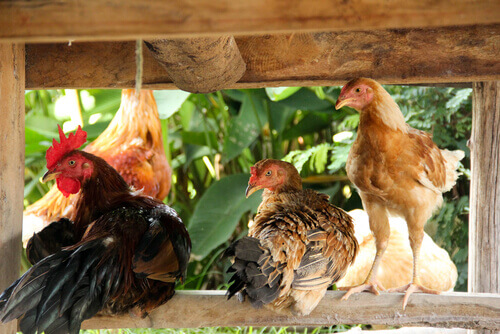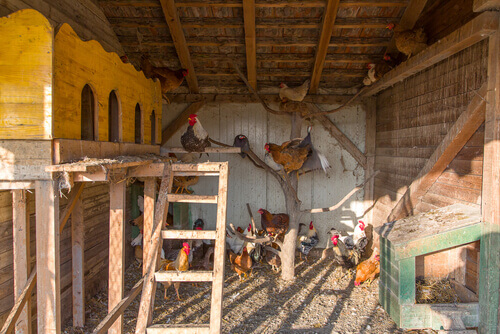Chicken Coop Hierarchy


Written and verified by the lawyer Francisco María García
As humans, we don’t have much influence over how our chickens interact in the hen house. In fact, after only a few days, birds set up their chicken coop hierarchy, and the pecking order falls into place quickly and naturally.
Several studies show that birds are extremely territorial creatures. They need to outline the roles and responsibilities of each member of the hen house, a structure that informs how the birds will live and interact with one another.
How is hen house hierarchy determined?
If there are only chickens in the coop, they will fight for power. The strongest ones will continue the fights until the clear winner appears and takes their place at the top of the pecking order. The time it takes to determine the hierarchy depends on the number of chickens in the yard.
While the chicken coop hierarchy is taking shape, the feistiest chickens will rule the roost. If you have a hen house or are considering getting chickens, you must know that you should never intervene in this natural process unless several chickens are ganging up on one and she is hurt.
All the chickens in the roost will respect the pecking order once it’s in place. The birds at the bottom of the pyramid will lower their heads to the alphas and there will never be challenges to power. In fact, the shyest ones will even run away when the strongest birds come into their space.

In general, if there’s a rooster around, he’ll take control naturally and won’t meet any resistance. The rooster almost always becomes the alpha bird and the rest of the coop will fall into line and continue to follow the previously established hierarchy.
Types of hens in the hen house
- Hostile dominant. These are the most aggressive birds. They constantly react violently towards the rest of the hens and their way of achieving domination is through fighting.
- Dominant cordial. This type of hen intervenes only when necessary. They’re intelligent and don’t get carried away with wild reactions.
- Submissive hostile. These birds are typically the ones at the bottom of the pecking order. Because of their attitudes, the other hens don’t trust them, which can lead to fights. These chickens isolate themselves because they’re usually attacked by the others if they approach.
- Submissive cordial. A step above the previous one, but equally left aside as they don’t inspire confidence with the other hens. This type usually has a history of trauma and abuse in other hen houses.
Whenever a new bird arrives at the yard, the chicken coop hierarchy will have to adjust to make room for the new addition. As a result, the fights and pecking will start back up again.
How humans can influence the pecking order
People shouldn’t interfere with the chickens’ processes or their hierarchical systems. However, humans can do a few things to try to maintain some type of order in the hen house.

- Properly water your chickens. Providing your chickens with enough spaces to drink water with easy access will help prevent fights from breaking out.
- Provide enough room for eating. Just like with water, food should be easy to access for all the hens in the roost. If feeding areas are too small, fights can happen or some chickens will never actually be able to eat.
- Collect eggs daily. You should never let eggs pile up in the chicken coop, instead store them in the right place in a timely matter. If you want your chickens to lay eggs, they need to feel calm and have enough room for laying.
- Promote quality rest. Another way to keep the peace in the hen house is by organizing how the hens will sleep. Set up different sections for the chickens to sleep, distributed throughout the coop and at different heights.
- Pick your battles. When there are disputes over power, sometimes you will have to step in and separate one of the lower pecking order chickens from being injured by the rest.
- Give enough space. A great way to help your chickens live in tranquility is by giving them enough space to move around, look for insects, and not step on each other’s toes all the time. As a result, your hens will be able to stretch their wings when they need to, thus avoiding many potential brawls.
A happy, healthy hen house
Humans and hens have a symbiotic relationship, you could say. If you have chickens, you’re responsible for providing them with a stable environment. In turn, when chickens’ needs are met in terms of space, food, and water, the birds will interact with each other better and likely lay more eggs.
However, peace and order in the chicken coop depend on other factors, as well. Sex, personality, strength, and weakness define positions in the chicken coop hierarchy. Mutual respect of the established social structures will ensure harmony in the hen house.
Finally, if you ever have to remove a hen from the roost (or if one dies), it’s important to know the coop will need an adjustment period, just like when a new bird enters the roost. With patience, attention, and time, order will be restored in the hierarchy and all birds will have their place in the chicken coop.
This text is provided for informational purposes only and does not replace consultation with a professional. If in doubt, consult your specialist.